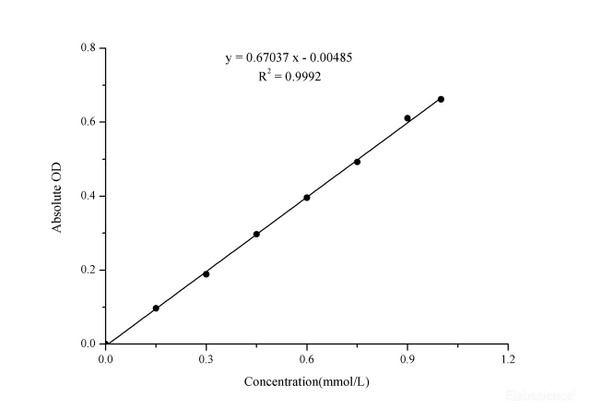Antioxidant Assay Kit - Information
Assay Genie's improved antioxidant assay measures total antioxidant capacity in which Cu
2+ is reduced by antioxidant to Cu
+. The resulting Cu
+ specifically forms a colored complex with a dye reagent. The color intensity at 570nm is proportional to TAC in the sample.
Applications
For quantitative determination of total antioxidant capacity (TAC) and evaluation of drug effects on TAC metabolism.
Antioxidant Assay Kit - Key Features
- Sensitive and accurate. Use 20 sample. Linear detection range from 1.5 to 1000 Trolox equivalents.
- Simple and high-throughput. The procedure involves addition of a single working reagent and incubation for 10 min. Can be readily automated as a high-throughput assay for thousands of samples per day.
Antioxidant Assay Kit - Data Sheet | |
| Kit Includes | Reagent A: 12 mL Reagent B: 1 mL Standard: 100 mL 50 mM Trolox |
| Kit Requires | Pipetting devices, centrifuge tubes, clear flat-bottom uncoated 96-well plates, plate reader capable of reading optical density at 570nm, homogenizer or sonicator etc. |
| Method of Detection | OD570nm |
| Detection Limit | 1.5 |
| Samples | Serum, plasma, urine, saliva, food and beverage etc |
| Species | All |
| Protocol Length | 20 min |
| Size | 100 tests |
| Storage | Store Reagent A at room temperature and other components at -20 °C. |
| Shelf Life | 6 months |
More Details
An ANTIOXIDANT is a molecule capable of slowing or preventing the oxidation of other molecules. Antioxidants protect the cells from damages by reactive oxygen species which are produced in oxidation reactions in the cell. Antioxidants can be small molecules such as glutathione, vitamins, or macromolecules such as catalase, glutathione peroxidase. As oxidative stress contributes to the development of many diseases including Alzheimer's disease, Parkinson's disease, diabetes, rheumatoid arthritis and neurodegeneration, the use of antioxidants in pharmacology is intensively studied. Antioxidants are also widely used as dietary supplements and in industry as preservatives in food, cosmetics, rubber and gasoline. Simple, direct and high-throughput assays for total antioxidant capacity (TAC) find wide applications in research, food industry and drug discovery.








